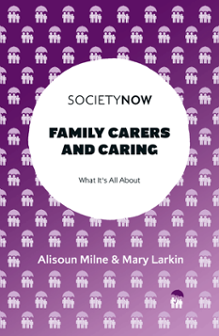
Glossary of Key Terms
ISBN: 978-1-80043-349-6, eISBN: 978-1-80043-346-5
Publication date: 4 October 2023
Citation
Milne, A. and Larkin, M. (2023), "Glossary of Key Terms", Family Carers and Caring (Society Now), Emerald Publishing Limited, Leeds, pp. 195-197. https://doi.org/10.1108/978-1-80043-346-520231011
Publisher
:Emerald Publishing Limited
Copyright © 2023 Alisoun Milne and Mary Larkin. Published under exclusive licence by Emerald Publishing Limited
Attendance Allowance: Attendance Allowance is a non-contributory welfare benefit that helps fund the extra costs of managing a disability that is severe enough to require support from another person/people.
Austerity: Austerity is a set of political-economic policies that aim to reduce government spending through cuts, tax increases or a combination of both.
Care:
Noun: The provision of what is necessary for the health, welfare, maintenance and protection of someone who needs care
Verb: Feel concern or interest; attach importance to something
Carer: ‘Anyone who cares, unpaid, for a friend or family member who due to illness, disability, a mental health problem or an addiction cannot cope without their support’ (Carers Trust: https://carers.org/about-caring/aboutcaring).
Carer's Allowance: Carer's Allowance is a non-contributory welfare benefit payable to people who care for a disabled person for at least 35 hours a week.
Carers organisations: These are (usually) third sector agencies that provide support, information and advice to family carers. Some carers organisations are commissioned by local authorities to conduct assessments of need and other statutory functions.
Caring:
Noun: The work or practice of looking after those who need help to care for themselves, especially on account of age or illness
Adjective: Displaying kindness and concern for others
Commissioning: This term refers to the process whereby a public sector employee (most often from a local authority) commissions (buys) a service from an independent sector provider on behalf of their agency. The provider may be from the private sector or the third sector. Most carers services are provided by the third sector and commissioned by the local authority.
Dyadic relationship: An intimate two-person relationship, often long term in nature.
Eligibility for support: Local authorities have a set of criteria (often broadly constituted) that define the levels and types of care needs that they will fund support for.
Inequality/ies:
Social inequality/ies refer to uneven access to social and economic resources across the life course. These underpin inequalities in health
Structural inequality refers to a system where prevailing social institutions produce, or reinforce, advantages for some groups or individuals and disadvantage others
Means testing: Adults with care and support needs and carers are (often) financially assessed by their local authority; if they have enough money, they will (usually) be expected to contribute to the costs of providing their services.
Paid carer/care worker: Workers who are paid to provide formal care to an older or disabled person who needs help to manage daily living tasks.
Personal budget: A payment given to a service user in lieu of a local authority arranged care package.
Personal care: Help with dressing, bathing, washing, shaving, feeding, using the toilet; physical help with walking, getting up and down stairs, getting into and out of bed; preparing meals, giving, administering and taking medicines and changing dressings.
Personalisation: Personalising services and support to meet the individual needs of adults with care and support needs.
Publicly funded social care: Social care services that are funded – and sometimes provided – by the local authority/local state (in the UK).
Self-funders: People who use their own private resources to pay for care services.
Service user/adults with care and support needs: ‘Adults with care and support needs’ is the phrase used in the Care Act to describe people who have a right to an assessment of need and/or have their ‘eligible needs’ met by their local authority.
Social care: The provision of social work, personal care, social support services to children or adults with needs arising from illness, disability or old age, support for carers, protection from abuse or neglect.
- Prelims
- 1 Introduction
- 2 Profile of Family Caring in the UK: Patterns and Trends
- 3 Impact and Consequences of Caring on Carers
- 4 Supporting Carers
- 5 Conceptualising and Understanding Care and Caring
- 6 Social Justice, Social Citizenship and Rights for Carers
- 7 Final Reflections: Looking Forward
- Glossary of Key Terms
- References
- Index